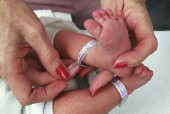
MONDAY, March 8 (HealthDay News) — About one in five babies born to mothers with hepatitis B aren’t getting treatments that have been shown to prevent the infection in newborns, a new study finds.
Given within 24 hours of birth, the hepatitis B vaccine and hepatitis B immunoglobulin can protect 85 percent to 95 percent of newborns from becoming infected, even if they were exposed at birth.
Researchers from the U.S. Centers for Disease Control and Prevention reviewed medical records of 4,762 mothers and 4,786 infants. The records represented about 25 consecutive live births from 190 U.S. hospitals, each of which was surveyed about their hepatitis B prevention policies in their labor and delivery departments.
Records showed that 18 women tested positive for hepatitis B at the time of admission to the hospital. While 62 percent of their newborns received the hepatitis B vaccine and immunoglobulin, nearly 14 percent left the hospital unvaccinated and nearly 20 percent did not receive immunoglobulin before discharge, according to the study.
Of 320 women whose hepatitis B status was unknown, meaning they may or may not have been tested for the virus, only about 52 percent of their infants were vaccinated within 12 hours of birth. About 20 percent of these babies left the hospitals without being vaccinated.
“A key message of the study is that hepatitis B virus transmission is almost entirely preventable through vaccination and prophylaxis,” said study author Bayo Willis, a CDC epidemiologist. “We really need hospitals to have correct policies in place and to implement those policies so that every newborn is protected before they leave the hospital.”
The study findings were released online March 8 in advance of publication in the April print issue of Pediatrics.
About 1.4 million U.S. residents have chronic hepatitis B infection, which causes from 2,000 to 4,000 deaths annually. Children can become infected during delivery or from household contact with those who are infected, according to background information in the study. The virus spreads through blood or other body fluids.
While many people who contract hepatitis B are able to eventually clear their bodies of the infection, some develop chronic hepatitis, which eventually can lead to cirrhosis and liver cancer.
Children are even more vulnerable to the disease. About 90 percent of children who contract hepatitis B go on to have chronic infections, many of whom will have liver disease by the time they’re in their 20s, said Dr. Kenneth Bromberg, chairman of pediatrics and director of the Vaccine Research Center at The Brooklyn Hospital Center. About 25 percent of them will die prematurely, according to the article.
The CDC recommends infants receive the hepatitis B vaccine at birth, and then receive booster shots at one and six months.
Pregnant women should also be tested for hepatitis B as part of their prenatal care, which is something not all women receive. In those situations, women should be tested upon admission to the hospital, Bromberg said.
Not all hospitals do so routinely, however. Only 67 percent of hospitals had a policy calling for all newborns to receive the hepatitis vaccine, while 63 percent of hospitals said they had a policy of testing women upon admission if there was no documentation of a hepatitis B test.
Nearly 81 percent of hospitals said they would give exposed infants the hepatitis B vaccine within 12 hours and about 77 percent said they would give the immunoglobulin within 12 hours.
“The more the hospital paid attention, the better the outcomes were,” Bromberg said. “The fact that only about 73 percent of hospitals even look at the results of the hepatitis test is pretty atrocious. That means 27 percent of hospitals don’t even look.”
In addition, researchers noted documentation errors in the medical records regarding mothers’ hepatitis B status, such as the mother’s record noting she had hepatitis B but the same information was not included in the infant’s record.
Each year, about 40 to 90 cases of perinatal hepatitis B are reported to the CDC, although the true number may be 10 to 20 times that, according to researchers.
“The greatest predictor of which children would get the hepatitis vaccine was the hospital having a policy for universal vaccination of infants,” Willis said. “Our study shows that gaps still persist in perinatal hepatitis B prevention.”
More information
The Hepatitis B Foundation has more on the vaccine.

